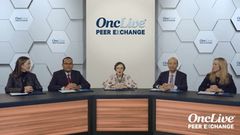
Treatment Options for Metastatic HER2+ Breast Cancer
Episodes in this series

Transcript:
Joyce A. O’Shaughnessy, MD: Let’s transition to metastatic HER2 [human epidermal growth factor receptor 2]—positive breast cancer. Let’s start with neratinib and the NALA trial, Aditya.
Aditya Bardia, MD, MPH: The NALA trial was a trial that was designed for patients with metastatic HER2+ breast cancer. They were randomized to receive neratinib with capecitabine versus lapatinib with capecitabine. Essentially, the bottom line is that overall, the trial was positive. There was an improvement in progression-free survival in the neratinib arm, as compared with the lapatinib arm. In terms of the adverse effects, diarrhea was seen with a higher degree in the neratinib arm as compared with the lapatinib arm. But as we are getting better with management of diarrhea related to neratinib, I think that is something that we can manage.
The metastatic setting is different from the adjuvant setting. The metastatic setting is a setting where patients have a higher tumor burden and we want to do whatever we can to target an aggressive tumor and prolong progression-free survival. Even a few months of improvement in progression-free survival could be important for an individual patient. I think the data are compelling, and it is possible that neratinib will get FDA approved in the metastatic setting, so I look forward to using neratinib with capecitabine instead of lapatinib. From a biology perspective, we have strong preclinical data that neratinib is a much better inhibitor of HER2 than lapatinib. So it’s good to see the preclinical data translate into clinical benefit. The issue in metastatic HER2+ breast cancer would be the sequencing of agents and that we have newer anti-HER2 agents, which ones to use, but I guess that’s a good problem to have.
Joyce A. O’Shaughnessy, MD: Yeah, exactly. I think in the NALA trial, too, there was a delay in the emergence of symptomatic CNS [central nervous system] metastasis there. The NEFERTT trial and then TBCRC 022 trial that looked at neratinib and looked carefully at CNS progression or new metastasis, both have shown some definite clinical activity. I think it was a 42% or 45% CNS response rate in pretreated patients with the combination of capecitabine and neratinib in the TBCRC trial. That’s fairly impressive. I can’t think of anything else that comes close to that, honestly. That’s quite impressive.
Then in the NEFERTT trial, which was paclitaxel-neratinib first line versus paclitaxel-trastuzumab, they were equivalent in terms of their overall progression-free survival. But the neratinib arm slowed the progression of known patients who entered with known metastasis and prevented the emergence of new metastasis too. That’s certainly encouraging, and it’s another reason I like to use neratinib in the adjuvant setting—because of the CNS penetration. We look forward to seeing whether we’ll have that approved by the FDA—hopefully, with the capecitabine and neratinib, I would imagine, so it met its primary endpoint. The other important dataset that we heard about was the SOPHIA trial with the new antibody.
Debu Tripathy, MD: The SOPHIA trial is very interesting because it’s based on very elegant biology. We’ve known for many years that the effect of trastuzumab initially is obviously on the HER2 receptor and presumably mostly owing to its effect on the growth factor function. However, the Fc portion of the antibody, it’s an IgG1, can activate antibody-dependent cellular cytotoxicity. We have hypothesized for quite some time, and more recently there has been better evidence that there’s an immune component to how trastuzumab and probably pertuzumab work. Moreover, it was found that patients who inherit a lower-affinity version of the Fc3-gamma receptor, which is what the Fc part of the antibody binds to, that those patients seem to have less of an effect to several antibodies—not just trastuzumab but also rituximab and cetuximab.
Margetuximab, the drug tested in the SOPHIA trial, is an engineered antibody, so that the Fc portion actually has a higher affinity for the Fc3-gamma receptor. This trial compared margetuximab with trastuzumab paired with 1 of 4 chemotherapy choices in later lines of therapy. It did meet its endpoint, but the progression-free survival was only about a month longer.
I think that that biology is elegant, and it does seem to work. I think the big question is how big is that clinical benefit. The drug is well tolerated. There was really no difference in the toxicity profile, and so it will be interesting to see how the FDA reacts to it. But certainly, it’s a step in the right direction. We’re starting to now prove that immunotherapy is important. Of course, there are many other studies looking at checkpoint inhibitors and ways to bring the immunotherapy into it. But I think it’s a clever idea, and it sort of worked.
Joyce A. O’Shaughnessy, MD: Yeah. I guess the question is for patients who do have that variant of the Fc-gamma receptor in the curative setting. Where the impact is in not-so-heavily pretreated patients, there might be a larger impact. It raises that question for the next step, in my mind.
Debu Tripathy, MD: Yes. Well, they did show that the patients who are either homozygous for the low affinity or heterozygous were the ones who seemed to benefit the most. But again, the absolute benefit was still on the small side for those folks.
Joyce A. O’Shaughnessy, MD: For a heavily pretreated population. So that’s interesting. We’ll watch that with great interest.
Transcript Edited for Clarity





































